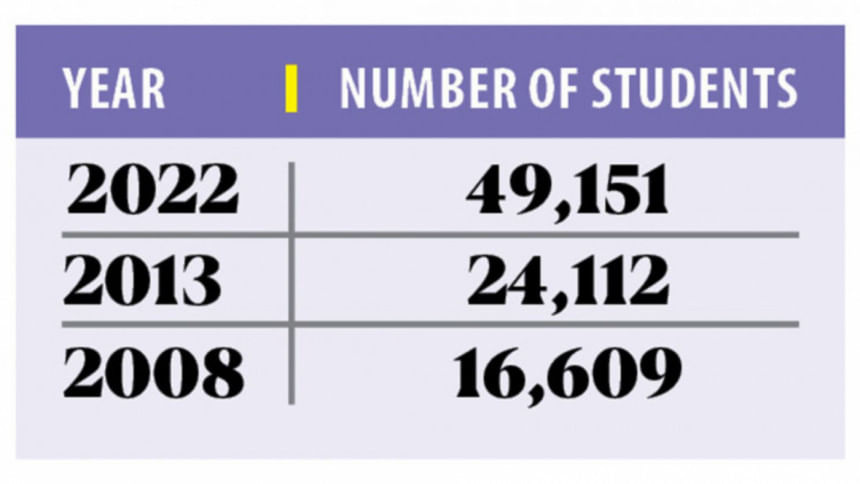Number of students going abroad triples in 15 years despite university boom

The number of students going abroad for higher studies has tripled in 15 years even though opportunities for higher education within the country increased significantly.
Experts say that despite the number of universities doubling in the 15 years, the flow of students leaving could not be ebbed for several reasons, including the lack of quality in higher education, political uncertainties, and limited scope of employment opportunities in the country.
In 2022, at least 49,151 Bangladeshi students went abroad for studying in 58 countries, according to the latest Unesco data.
The number was 24,112 in 2013 and 16,609 in 2008.
Since 2008, the government established 25 new public universities and approved 56 private universities to meet the growing demand for higher education.
At present, 44 lakh students are enrolled in 53 public and 111 private universities and their affiliated colleges in the country.
However, educationists say the majority of the new institutions lack the necessary infrastructure, skilled faculty, and research facilities to ensure quality education.
Dil Afroza Begum, an ex-member of the University Grants Commission (UGC), said the rising number of universities would mean little if the quality of education is not ensured.
"We are focusing on the construction of buildings, but not paying attention to what is needed for ensuring quality education -- recruiting better teachers, research facilities, modern laboratories and others," Dil Afroza told The Daily Star recently.
There is no mechanism in place to measure the quality of education at universities here. But at international rankings, Bangladeshi universities perform dismally.
According to the 2023 Times Higher Education World University Rankings, Dhaka University and North South University were ranked between 601 and 800. Bangladesh Agricultural University (BAU), Bangladesh University of Engineering and Technology, and Khulna University of Engineering and Technology (KUET) were ranked between 1,201 and 1,500.
The rankings, based on 13 performance indicators, included 1,799 universities across 104 countries.
The DU and the NSU have been ranked 186th and 192nd respectively in the UK-based Times' Asia University Rankings 2023, which included 669 universities from 31 territories.
"I wasn't learning anything new. There is limited scope of specialisation and research-related freedom. It couldn't add to my skills for the sector I want to work in,' explained a Dhaka University graduate, who preferred not to be named, as the student reasons to pursue a master's degree at a university in the US.
Although, the US, the UK, Australia, Canada, Germany, Japan and some other European countries are among the usual destinations for Bangladeshi students, in recent years many students are opting for other countries.
According to the Unesco data, the United Arab Emirates is the top destination for Bangladeshis with 11,157 students followed by the USA with 8,665 students and Malaysia with 6,180.
Kazi Faridul Haque, president of the Foreign Admission and Career Development Consultants Association of Bangladesh, said thousands of students are going to the UAE and Malaysia in recent years as the cost of studying in these countries is comparatively low.
"Besides, many students, especially the madrasa-based ones choose these Muslim-majority countries," Haque claimed.
Prof Abdul Mannan, a former UGC chairman, said quality the UAE and Malaysian universities are affiliated with universities in the UK, the US, and other Western countries.
This makes these universities attractive choices for students here who can't afford direct admission to institutions in the UK or US, he added.
He said foreign universities are offering scholarships and other facilities to get international students.
"Besides, the improved financial capacity of a section of Bangladeshis is also a factor," he said, adding that in the past only upper-class or very bright students could afford to study abroad.
But now, due to financial solvency, higher-middle class, as well as middle-class families, can send their children abroad for higher education, added Mannan.
According to education consultancy firms, English medium students prefer undergraduate programmes abroad while mainstream Bengali medium students usually go abroad for post-graduation courses.
Dil Afroza said the number of English medium schools has increased in recent times, and students of these institutions generally struggle with admission tests at public universities, mainly due to differences in curriculum.
"Besides, limited job opportunities, nepotism, and corruption in the job market here prompts many parents to send their children abroad so that they can settle there," she observed.
However, Mannan said the lack of quality education at many public and private universities remains a big issue.
"These institutions lack the atmosphere needed for higher education. Most of these do not have adequate research facilities and quality faculty to attract students," said Mannan.
"Sadly, education here remains exam and certificate centric, not knowledge-centric. We focus on numbers, not quality. A university is more than bricks and mortar," he added.
Both Mannan and Dil Afroza said that political uncertainties are also a reason why many students go abroad for better study and life there.
Mannan said brain drain is a longstanding problem for Bangladesh as the country is deprived of service as the majority of these students do not return home after completing their studies.

 For all latest news, follow The Daily Star's Google News channel.
For all latest news, follow The Daily Star's Google News channel. 







Comments